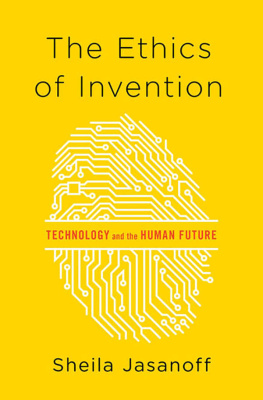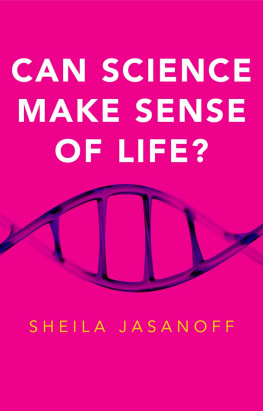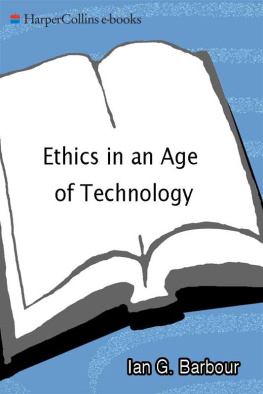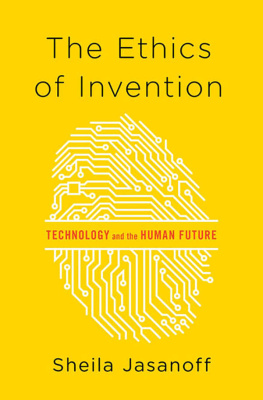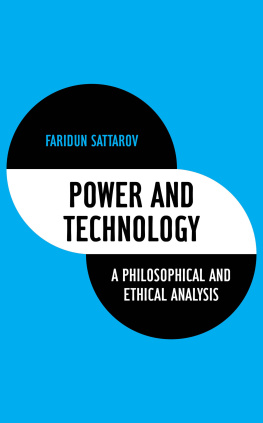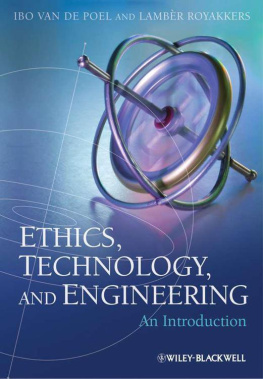
THE ETHICS
OF INVENTION
Technology
and the
Human Future
Sheila Jasanoff

W. W. NORTON & COMPANY
Independent Publishers Since 1923
NEW YORK * LONDON
Copyright 2016 by Sheila Jasanoff
All rights reserved
First Edition
For information about permission to reproduce selections from this book,
write to Permissions, W. W. Norton & Company, Inc.,
500 Fifth Avenue, New York, NY 10110
For information about special discounts for bulk purchases, please contact
W. W. Norton Special Sales at specialsales@wwnorton.com or 800-233-4830
Production manager: Julia Druskin
Jacket design by Fort
Jacket art by Digitalvision Vectors / Getty Images
The Library of Congress has cataloged the printed edition as follows:
Names: Jasanoff, Sheila, author.
Title: The ethics of invention : technology and the human future /
Sheila Jasanoff.
Description: First edition. | New York : W.W. Norton & Company, [2016] |
Series: The Norton global ethics series | Includes bibliographical
references and index.
Identifiers: LCCN 2016014456 | ISBN 9780393078992 (hardcover)
Subjects: LCSH: InventionsMoral and ethical aspects. | TechnologyMoral
and ethical aspects.
Classification: LCC T14 .J34 2016 | DDC 174/.96dc23 LC record available at
https://lccn.loc.gov/2016014456
ISBN 978-0-393-25385-6 (e-book)
W. W. Norton & Company, Inc.
500 Fifth Avenue, New York, N.Y. 10110
www.wwnorton.com
W. W. Norton & Company Ltd.
15 Carlisle Street, London W1D 3BS
For Nina
ALSO BY SHEILA JASANOFF
Science and Public Reason
Designs on Nature: Science and Democracy in Europe and the United States
Science at the Bar: Law, Science, and Technology in America
The Fifth Branch: Science Advisers as Policymakers
Risk Management and Political Culture:
A Comparative Study of Science in the Policy Context
Controlling Chemicals: The Politics of Regulation in Europe and the United
States (with Ronald Brickman and Thomas Ilgen)
Dreamscapes of Modernity: Sociotechnical Imaginaries
and the Fabrication of Power (with Sang-Hyun Kim)
Reframing Rights: Bioconstitutionalism in the Genetic Age
States of Knowledge: The Co-Production of Science and Social Order
Earthly Politics: Local and Global in Environmental Governance
(with Marybeth Long Martello)
Comparative Science and Technology Policy
Learning from Disaster: Risk Management after Bhopal
THE ETHICS OF INVENTION
A book is the end of a journey, and good journeys happen in company. This book was on its way longer than originally planned. It began life as a simple monograph on the risks of modern technology, but, as the publishers vision for the series changed, it turned into a more complex reflection on political inclusion and exclusion in the crafting of humanitys technological future. I would like to thank the editorial team at Norton for its steady support throughout that transformation. Anthony Appiah set things in motion by urging me to take on the project in the first place. Roby Harrington offered much appreciated patience during downtimes, and Brendan Currys smart and careful reading helped clarify the main messages of a manuscript that sometimes got lost in expository details. I am also grateful to Sophie Duvernoy and Nathaniel Dennett for smoothly shepherding the book through the logistics of editing and publication.
Some empirical material covered in the book represents new research on law and technology; much of the rest derives from earlier work revisited in a new analytic context. As a result, the book owes less to particular individuals or projects than it does to collective ways of thinking and working fostered in the Program on Science and Technology Studies that I direct at the Harvard Kennedy School. Weekly meetings with fellows in the program over the past few years offered a space for deepening and honing my ideas on the ethical and political dimensions of governing technology. Three conversation partners deserve mention by name: Rob Hagendijk, Ben Hurlbut, and Hilton Simmet. Much of what this book says about the constitutiveand constitutionalrole of technology and democracy in modernity reflects my ongoing exchanges with each of them, though none bears any responsibility for omissions and weaknesses that are, as always, the authors own.
I also benefited enormously from working, as principal investigator, on two National Science Foundation (NSF) grants related to the books subject matter: The Fukushima Disaster and the Politics of Nuclear Power in the United States and Japan (NSF Award No. 1257117) and Traveling Imaginaries of Innovation: The Practice Turn and Its Transnational Implementation (NSF Award No. 1457011). NSF has played a crucial role in the evolution of my career, as well as my efforts to build the field of science and technology studies, and I am pleased once again to acknowledge the Foundations support. I would also like to thank Shana Rabinowich, whose contributions to the successful management of all my projects for the past six years cannot be overstated.
Lastly, my familys presence in my life is too foundational to need many words of acknowledgement. Since this is a book about the future, it seems especially appropriate to dedicate it to Nina, who will have a hand in shaping a world that I can at best dimly imagine.
and nonliving matter with the decoding of the human genome and the ability to create and deploy a world of novel human-made materials.
Speed, connectivity, and convenience matter a lot, but for most of Earths seven billion people the quality of life matters more. Here, too, a century of accelerating technological invention has changed us. Work is safer. Air and water in many parts of the world are measurably cleaner. We live appreciably longer. The World Health Organization (WHO) tells us that global average life expectancy at birth in 1955 was just 48 years; in 1995 it was 65 years; in 2025 it will reach 73 years. Technological innovations account for the trend; better sanitation, drinkable water, vaccines, antibiotics, and more abundant and wholesome food. People not only live longer but enjoy their lives more, through increased access to travel, recreation, varieties of food, and, above all, improvements in health care. If asked whether we would rather be living in 1916 or in 2016, few today would opt for a hundred years ago, even if the world back then had not been racked by war.
Adding up to what some call a second industrial revolution, the technological advances of the past century have propelled wealthy nations to the status of knowledge societies. We have, or are poised to have, unprecedented amounts of information about peoples genetic makeup, social habits, and purchasing behavior, and those data are expected to enable new forms of commerce and collective action. State census bureaus are no longer the only bodies that can compile masses of data. Search engines like Google and Yahoo have also become voracious data gatherers, rivaling governments. Even individuals can use devices like Fitbit or the Apple watch to monitor and record volumes of information about their daily activities. Digital technologies have made it possible to combine previously incommensurable forms of data, creating useful convergences between physical, biological, and digital records. What we know about a person today is no longer just a matter of physical descriptors, such as height, weight, ethnicity, and hair color. Nor can people be located through only a few static markers, such as an address and a phone number. Instead, biometric information has proliferated. Passports, for example, can be linked to information gleaned from fingerprints and iris scans collected from anyone who crosses a national border. Apple incorporated a digital fingerprint sensor into its smartphones in the 2010s to replace numerical passcodes and to offer greater security.
Next page
